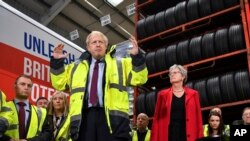Britain’s political leaders are making a final push for votes ahead of Thursday’s general election, which has been dominated by the issue of Britain’s exit from the European Union.
A new report from analyst group The UK in a Changing Europe at Kings College London concludes that both the ruling Conservative party and opposition Labour party manifestos are vague or misleading on Brexit — and warns the agonizing over Britain’s future relationship with the EU is only likely to get worse.
The Conservatives plan to leave the European Union on Jan. 31, 2020, under the Withdrawal Agreement negotiated with Brussels, if they win a majority on Dec. 12. Party leader Boris Johnson toured a fish market in the port of Grimsby on Monday, pledging to boost the industry after Brexit.
“I think it's an opportunity here to look at one of the ways in which this country will take back control of a massive industry once we get Brexit done in January,” Johnson said.
Far from “massive,” commercial fishing makes up just 0.1 percent of the British economy — but control of fishing rights holds symbolic value for many pro-Brexit voters, who want to prevent European boats from accessing British waters.
However, three-quarters of British-caught fish is exported, most of it to the European Union — and any trade barriers could hurt the industry.
The Conservatives election mantra is “Get Brexit done.” But Britain has yet to negotiate its future relationship with the EU and that will likely take years. Such Brexit trade-offs have been largely ignored, says Jill Rutter of The UK in a Changing Europe program.
“One of the things the Conservatives have said is ‘we can get a good trade deal done with the EU by December 2020. We’re not going to ask for another extension,’” said Rutter. “That looks pretty unrealistic to most people. And it’s very unclear exactly where the Conservatives are heading on that relationship.”
The opposition Labour party has tried to focus on other issues, like the health service, and has sometimes struggled to communicate its stance on Brexit, something that could cost them at the ballot box. The party promises to renegotiate a better Brexit deal then hold another referendum.
“So they talk about not full alignment with the Single Market rules, but close alignment,” noted Rutter. “I think the EU might want to ask what that’s about, because remember they really didn’t like it when (former Prime Minister) Theresa May said ‘I want to pick and mix which rules I go with.’”
For their part, the Liberal Democrats say they would cancel Brexit altogether. They could be kingmakers if no one party wins a majority Thursday.
Polls suggest Boris Johnson’s Conservatives will gain a majority. But there could be a surprise. Some 3.85 million people have newly registered to vote in the last few weeks, with roughly two-thirds of those aged under 35 — a demographic that tends not to vote Conservative.
Jason Palmer, a Student Union officer at Bristol University in the west of England, says many young people are engaging in the election debate.
“I think a lot of this comes from the discontent that's previously been experienced in terms of young people feeling as though their voices don't matter in politics,” Palmers said. "Or that they didn't have a say, for example, in the 2016 Brexit referendum.”
The prime minister’s own constituency of Uxbridge could be the biggest surprise. The area voted to remain in the European Union in 2016 — and the Labour candidate for the seat, Ali Milani, believes he can win there.
“We only need a 5 percent swing to take this seat, to unseat a prime minister which would be the first time in British democracy's history that that's ever happened,” Milani said.
Another factor could be another great British obsession: the weather. A cold snap is forecast, which could persuade some voters to stay home.
Will Britain vote for a change of direction? Or will the election push Britain deeper into political quagmire? The result is due in the early hours of Friday.






